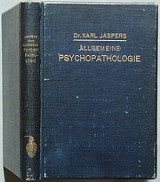
psychiatrist
and philosopher who had a strong influence on modern theology
, psychiatry
and philosophy
. After being trained in and practicing psychiatry, Jaspers turned to philosophical inquiry and attempted to discover an innovative philosophical system. He was often viewed as a major exponent of existentialism
in Germany
, though he did not accept this label.
Jaspers was born in Oldenburg
in 1883 to a mother from a local farming community, and a jurist father.
Reason is like an open secret that can become known to anyone at any time; it is the quiet space into which everyone can enter through his own thought.![]()
I approach the presentation of Søren Kierkegaard|Kierkegaard with some trepidation. Next to Friedrich Nietzsche|Nietzsche, or rather, prior to Nietzsche, I consider him to be the most important thinker of our post-Kant|Kantian age. With Goethe and Hegel, an epoch had reached its conclusion, and our prevalent way of thinking — that is, the Positivism|positivistic, natural-scientific one — cannot really be considered as philosophy.![]()
It is the search for the truth, not possession of the truth which is the way of philosophy. Its questions are more relevant than its answers, and every answer becomes a new question.![]()
The general fellowship of our human situation has been rendered even more dubious than before, inasmuch as, though the old ties of caste have been loosened, a new restriction of the individual to some prescribed status in society is manifest. Less than ever, perhaps, is it possible for a man to transcend the limitations imposed by his social origins.
![]()
The masses are our masters; and for every one who looks facts in the face his existence has become dependent on them, so that the thought of them must control his doings, his cares, and his duties. Even an articulated mass always tends to become unspiritual and inhuman. It is life without existence, superstitions without faith. It may stamp all flat; it is disinclined to tolerate independence and greatness, but prone to constrain people to become as automatic as ants.
![]()
The would-be climber must be able to make himself liked ... please his superiors — avoid showing independence except in those matters wherein independence is expected of him by his chiefs... the winners in the race have qualities which disincline them to allow others to be their true selves. Hence the winners snub all those who aim at adequate self-expression, speaking of them as pretentious, eccentric, biased, unpractical, and measuring their achievements by insincere standards.
![]()

